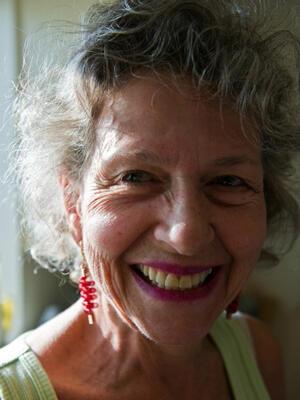Bernice W. Kliman
An outstanding Shakespearean, dedicated editor, and wonderful colleague, Bernice W. Kliman brought vibrancy, enthusiasm, and intellectual curiosity to all she did. She was a woman of unbounded energy and sense of humor, characterized by her decorative stockings and delightful swagger.
Foremost among her many accomplishments was her Shakespearean scholarship as editor of the Variorum Hamlet, as a member and often chair of the Columbia University Shakespeare Seminar, but most especially her pioneering research of film productions of Shakespeare.
In 1976, at a time when Shakespeare scholars were unconvinced of the value of producing films of Shakespeare’s plays, she and the late Kenneth Rothwell of the University of Vermont started the Shakespeare on Film Newsletter. Growing out of their meeting at a NEMLA Conference, it became an important source for scholars and a voice for criticism. The publication continued until 1992 when it was incorporated into the Shakespeare Newsletter where it is still a vital critical resource.
Bernice Kliman understood the important role film could play in broadening our understanding of Shakespeare’s plays and giving audiences another way of seeing the works. This interest led to her 1988 book, Hamlet: Film, Television, and Audio Performance. In her next book, Macbeth in Performance, she again applied techniques learned from the close study of film. By then her understanding of the role of prompt books also informed her text on Macbeth
During this time Bernice also drew on her skills as an organizer and initiator. She decided to take on the editing of The Variorum Hamlet, assembling a team of scholars to work with her. Although she did not live to see this completed, her Enfolded Hamlet — an amazing source on all-things Hamlet — grew out of this research. She also co-edited with Laury Magnus, the New Kittredge Shakespeare edition of Romeo and Juliet (2008) and the forthcoming Measure for Measure (2012). Over her long career, Bernice wrote or edited 13 books.
Born on July 22, 1933, in Buffalo, New York, to Rebecca and Leo Widgoff, Bernice grew up in an educated and enlightened home. Her father had a BA in Philosophy, an MA in Chemistry, and a law degree. Leo Widgoff had faced anti-Semitism when seeking a chemistry position, but times change. Bernice’s older sister Mildred had a degree in physics; she was recruited by the Manhattan Project and was later Professor of High Energy Physics at Brown University — a first for a woman and a Jew.
The family’s commitment to Judaism permeated their lives. As a teenager, Bernice was a member of Habonim, a labor Zionist organization with a leaning toward socialism. At a party in 1947, she met her future husband, mathematician Merwin Kliman. They were wed on January 31, 1951, despite the protests of family members who thought that they were much too young. They were married for 60 years and had four sons before Bernice’s death in 2011.
She received her Ph.D. in 1969 from City University of New York Graduate Center and taught at Baruch, Queens, and Yale before receiving a full-time appointment at Nassau Community College. There she won a FIPSE Grant to start Nassau’s Active Learning Project, a year long practice in pedagogy. She also developed a popular project: Shakespeare Stage and Page Summer Seminar.
Ever a team player, Bernice remembered, when she heard my book topic, that a scholar friend had spoken of multimedia materials on a similar subject packed away in his attic and out of circulation. She put us in touch with one another. Eventually his many slides arrived at my door and enhanced my book. Bernice’s wish to connect people with one another endeared her to her friends.
A scholar not only of Shakespeare and English literature but also of the Bible, Bernice decided to have an adult bat mitzvah. When she and Merwin first moved to New York, they joined a Conservative synagogue where she taught Hebrew School. However, she found that her feminism conflicted with the synagogue practice of denying women a place on the bimah. Only later did she realize her dream when the Klimans transferred their affiliation to the Reconstructionist Synagogue of the North Shore. There she found a sympathetic rabbi and a group of congregants who also believed in women’s equality.
Her feminism had deep roots. As a board member of the Columbia University Shakespeare Seminar, she fought constantly for balance in invited speakers between men and women. To Bernice, there was no such thing as an area where male scholars excelled and were therefore thought to outweigh women. She knew, as did other feminists, that the field had more than its share of serious women Shakespeareans. They only needed an opportunity to speak. Bernice became their voice and champion.



